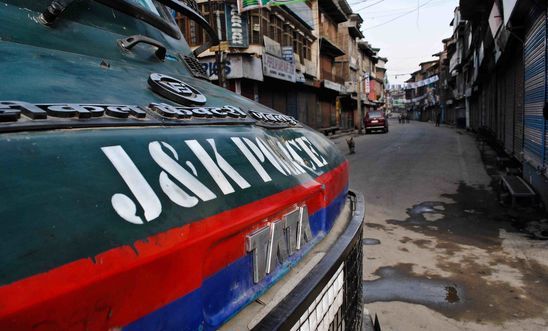
Press releases
India: Government must immediately release Jammu and Kashmir political leaders

Human rights violations risk going unreported because of communication blockade
Administrative detention used by authorities to curb political mobilisation
Amnesty International today called on the Government of India to immediately release all political leaders in Jammu and Kashmir and put an end to the deliberate silencing of voices in the region.
Following the unilateral revocation of Article 370 of the Indian Constitution that guaranteed special status to Jammu and Kashmir by the Government of India, authorities have allegedly detained several political leaders, including former Jammu and Kashmir chief ministers Farooq Abdullah, Omar Abdullah and Mehbooba Mufti; former bureaucrat-turned-politician Shah Faesal and Ravinder Sharma.
Amnesty International India’s Executive Director, Aakar Patel, said:
“For the 22nd day in a row, life has been derailed for the people of Jammu and Kashmir. The communication blockade and security clampdown, the alleged detention of political leaders and restrictions on media to report has created an information black hole in Jammu and Kashmir, a region which has witnessed serious human rights violations in the past.
“Depriving an entire population of their right to freedom of expression, opinion and movement for an indefinite period runs squarely counter to international norms and standards. Worse, it gives the Government of India a near-total control over the information coming out of the region.
“This turns the fear of human rights violations that may occur yet remain unreported into a reality which only stands to perpetuate impunity and diminish accountability in Jammu and Kashmir – a culture the Government of India continues to extend in spite of its promises of development and change.”
Amnesty International has previously documented the use of administrative detention, where a person is held without a charge or trial, by the authorities in the region to curb political mobilisation. These detentions not only violate international law but clearly indicate the stifling of freedom of expression in the region.
No official information is available on the number of people detained, their access to lawyer or their family members, where they are being held and under what charges, if any.
Communication blockade
Amnesty International is concerned about the wider human rights impact of the communication clampdown. While access to information to the people of Jammu and Kashmir remains hindered in times of crises, their access to emergency services, and other information and services, including healthcare and education also remains highly restricted.
The unlimited clampdown also hampers the government from circulating information to communities about the ongoing protests which could be vital for the safety and protection of the local population of Jammu and Kashmir.
The clampdown has also restricted journalists and activists from documenting and sharing information about the situation in the region, including allegations of human rights abuses. The local media websites of the region remain last updated on 5 August and print versions of the newspapers have not been carrying editorial opinions pieces. Besides hindering the public’s right to know, it also puts the lives of journalists at risk, increasing their chances of being harassed, arrested on politically motivated charges and prosecuted in connection with their work.
The UN Human Rights Council has called on the Government of India to end this crackdown, calling it a “form of collective punishment” for the people of Jammu and Kashmir “inconsistent with the fundamental norms of necessity and proportionality”.
The UN Special Rapporteurs and Working Groups have also raised their grave concerns about “allegations that the whereabouts of some of those detained is not known as well as the general heightened risk of enforced disappearances, which may proliferate against the backdrop of mass arrests and restricted access to the internet and other communications networks”.
Between 5 and 21 August, 152 people were admitted to Srinagar's Sher-e-Kashmir Institute of Medical Sciences (SKIMS) and Shri Maharaj Hari Singh hospital with injuries from pellet shots and tear gas fire, according to data acquired by Reuters news agency. However, because of the communication clampdown, the exact number of casualties remain difficult to confirm.